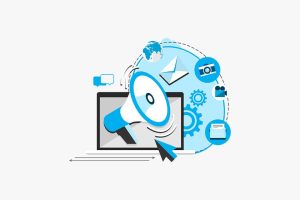What Is The Future Of B2B In Digital?

As with the B2C sector, the sales process within B2B has undergone many changes. If before, offering telephone support to customers was the norm, today chatbots want to be the new sales people of tomorrow. A situation that may worry fans of verbal communication but which can only delight business owners in terms of resources saved. This is one example among many of the next developments to come within BtoB.
In this article, we will focus on the evolution of this sector.
We offer you a vision of what B2B could become in the future.
Table of Contents
The Use Of Data At The Service Of The Customer Experience
You are not unaware that today data is the gold mine of companies. The GAFAMs (Google, Apple, Facebook, Amazon and Microsoft) prove this to us. Their wealth comes from all this data collected, analyzed and processed. Thanks to very advanced analyzes, these companies are able to understand the behavior of any customer and even better than the customer himself. We are indeed in an era where the majority of companies collect data to increase their efficiency and take advantage of a competitive advantage by adapting their content.
The customer experience of b2c commerce is ahead of that of b2b commerce . That is to say, it includes more digital marketing techniques and advanced business techniques with the aim of increasing business productivity. But it must be taken into account that professionals are above all individuals. Which means that they have already had the opportunity to benefit from good customer experiences. They therefore become demanding and their expectations are high. To meet this demand and thus be successful, b2b companies will certainly align themselves with b2c companies.
Currently, the b2c sector leverages collected data more than the b2b sector. This is due to the difference in behavior between these two types of clients. When an individual wishes to buy a product online, he does not necessarily know what he wants to buy. Who has never compared several products and visited several pages of the same site to make their choice?
While a professional will already know concretely what he wants. His superior will surely tell him to place an order for a well-defined product. If we analyze his behavior, the customer will do research on the internet and will look directly for the characteristics that interest him.
Hence the interest of properly optimizing its b2b sales pages and providing all the necessary information. This is how the customer experience comes into play in the journey of a professional customer.
If we take this statistic into account, companies will have no choice but to analyze and understand the behavior of a professional in order to offer them the best possible customer experience. A bad analysis or a small optimization error could lead to a loss of customers. We must not forget that customers are volatile. A customer who enjoys the buying journey with a competitor is a lost customer.
The increase in collected data and the increased growth of technological advancements will undoubtedly create new customer experiences. We could for example expect the use of 3D to present products and thus visit a virtual store with the idea of reducing the travel of salespeople.
Artificial Intelligence (AI) For A More Effective B2B Strategy
The Digitization Of Customer Service
What about customer service? Looking back a few years, customer service in b2b companies wasn’t quite like it is today. Previously, salespeople traveled regularly to sell their products or services to other companies. Most communication was done over the phone or face to face. Buyers needed to communicate for a long time to get to know the people in front of them. The relational aspect took precedence over the product.
Today, companies still do it this way. But lately, especially since the Covid-19 pandemic, relationships between companies are changing. We are witnessing a decrease in commercial teams in companies to concentrate on other trades. It is no longer the relationship that takes precedence but the information available on the internet, as this figure underlines: “B2B buyers make an average of 12 searches on search engines before committing to a solution or a supplier. »
Customers want to go fast and be more efficient. Online chats have therefore increased considerably. They allow customers to contact an advisor via a chat, to ask them all the questions they want and to benefit from support in their efforts. When it comes to sales support, the use of chat also benefits them. Sales reps can respond to questions quickly and therefore process more requests in a day.
Likewise, 24/7 chatbots have replaced sales support work. It is no longer a human in front of us but a robot. A robot capable of answering our most frequently asked questions. Of course, it would have been unthinkable a few years ago to think that these robots would replace telephone contact. But these chatbots are beneficial for both businesses and customers. Indeed, companies save time by avoiding answering common questions and customers find the answers in a few clicks.
Thanks to artificial intelligence, chatbots are able to answer ordinary questions. But what about more open questions leading to long discussions? It could be that in the near future, work on artificial intelligence would allow chatbots to answer any type of question. This would lead to even smaller sales teams and more work from marketing teams to highlight all possible information on products and services. Because as said before, the further we go, the more buyers want to be more efficient and not waste time negotiating.
The commercial contact will no longer be the same, but other specificities will be added to these new digital sales techniques.
Personalize The Shopping Experience
In order to increase the number of customers and therefore the number of sales, companies will most certainly turn more and more to personalization .
As individuals, we very often find personalization during our shopping experiences. Marketing teams know this is a lever to increase conversions. Because, what could be more effective than offering its customers products that suit them.
Within b2b sales, personalization remains less used. And yet, it could apply in the same way as in b2C. This could be to offer b2b online catalogs based on individual preferences or to provide recommendations tailored to each profile.
By not customizing their b2b sales processes, companies will risk losing all their customers and reducing their turnover. Because, with all this digitalization to come, personalization will be the key to replacing the human side of an advisor. Since without customization, the advisor becomes necessary to choose the right solution. To meet this need to personalize sales processes, many b2b digital marketing recruitments should take place in addition to web development recruitments.
Also Read: B2B, How To Take Advantage Of The Business To Business Model
Conclusion
As we can see in recent years, digitalization has accelerated, enough to change all the habits of professionals. All the processes before now contain a digital part such as carrying out research on the internet and prospecting online.
This rise of digital makes it possible to affirm that all the tasks carried out by b2b companies will be 100% digital. Data mining and artificial intelligence will be at the heart of business processes. The future within the b2b sector promises us new innovations.






